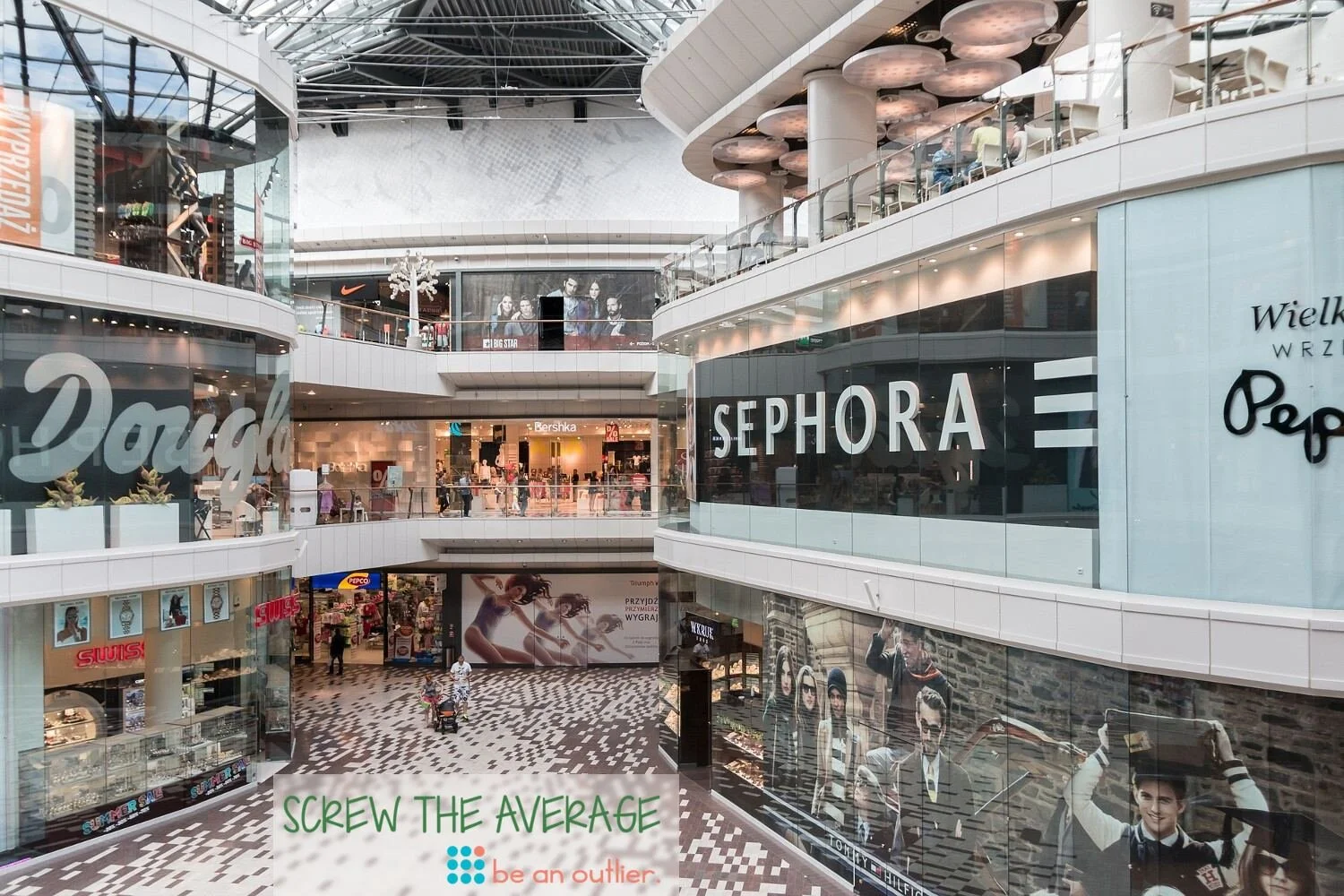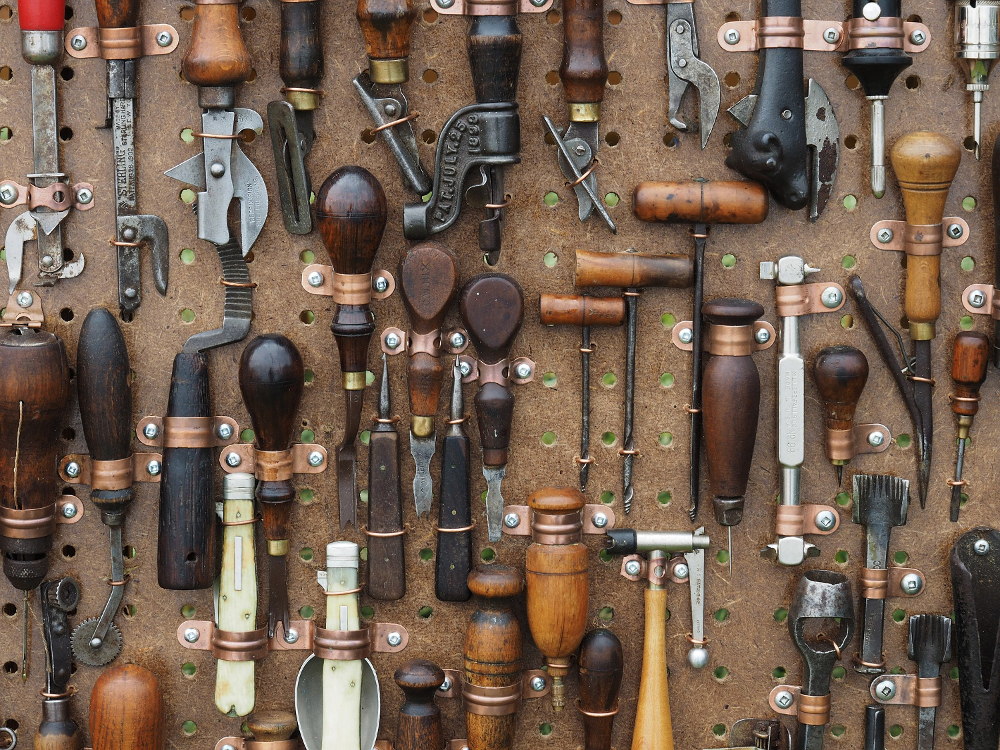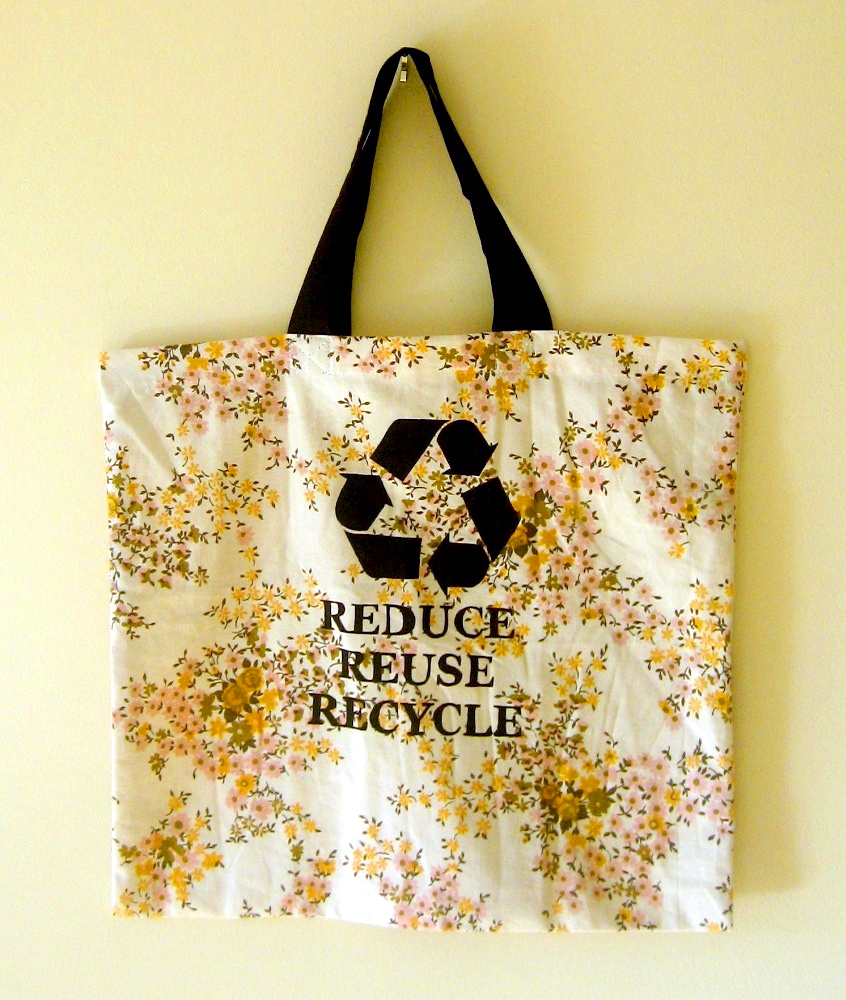How to Use Less and Still Live Comfortably
We pride ourselves in being above average, as you might have discerned from the blog name, our tag line, and our first post. In our effort to apply our ideology of being in the 90th percentile (again, read the first post) to all aspects of our lives, we're dedicated to using less stuff.
This manifests itself as minimalism, which is a post in and of itself. It also comes through in our constant effort to use and consume less stuff.
Disclosure: We may receive a commission for links on our blog. You don’t have to use our links, but we’re very appreciative when you do. Thanks again for your support, we hope you find our posts and information helpful!
The Benefits of Using Less Stuff
Using less stuff has a multitude of ancillary benefits and there’s typically a butterfly effect.
When we use less stuff, we go to the store less often because our shopping list is shorter. Buying less means spending and consuming less, which of course means saving money. Saving money means lowering our cost of living. When we lower our cost of living, we need to make less to support ourselves.
Common sense, yes we know. However, take it a step further and we realize that having a lower cost of living means we need to save less for the future as well.
“We can save more, live on less, and therefore have the ever coveted FU Money*.”
In turn, we reduce stress and ‘noise’ in our life, e.g. traffic, work we don’t love, etc.
If this appeals to you, we encourage you to read more on financially independent, retire early (FI/RE)!
Using less makes our life simpler. In other words, we’re less dependent on ‘this’ or ‘that’. So, when we’re in new or changing circumstances, like traveling, or there’s stress on time or resources, we have less to worry about, and we can go with less or do without.
Using less stuff also means causing a smaller impact on the environment. The obvious is using less water, less electricity, and less gas. But we also consume less material stuff, like packaging, hygiene products, clothes, electronics, furniture, etc. This means less product is made, transported, and housed, saving negative impacts on the environment through less mining, manufacturing, transporting and sitting on a store shelf.
We’re not naive, or holier than thou. We know the planes will continue to fly whether all the seats are full or not, but it has to start somewhere and with someone. Why not us, or you?
*FU Money is having enough savings to feel comfortable telling someone (your employer for example) to F-off if they’re asking something unreasonable. The ‘F-Off’ is more for effect, but you get our drift. FU Money is money that lets you live the way you want, without fear of losing your job or source of income. We highly recommend reading more on this at jlcollinsnh: The Simple Path to Wealth
How to Use Less Stuff
Using less isn’t easy, or we’d all do it. Here are a few tips we apply regularly to our lives. As with everything, it takes effort and consistent practice.
Make It a Priority.
Start with the end in mind. Evaluate and ask yourself why it’s important, why are you embarking down this path. Is it for savings and retirement, budget, environmental, stress reduction, or a combination of a few things?
When you realize why it’s important, it helps anchor it as a priority in your life, making it easier to start and stick with it.
It’s a Step by Step Process
We didn’t sit down one day and say to ourselves, “Today we’re going to cut our shampoo and conditioner allotment by 70% and we’re going to drive 1/5 of the average miles American’s drive”. Instead, we did it over time.
A fast and furious approach would have certainly caused us little chance of success. That’s simply unrealistic. Instead, be intentional, take your time, and start small. Once you’re comfortable going without or using dramatically less of something, move on to something else.
Track it
We started by keeping track of how much we use of something, by the volume used in each application and the total life or duration of a product over time.
For example, a twelve-ounce bottle of shampoo lasted us a month and each shower was about two quarter dollop sizes of shampoo used. We know this about most every consumable we use, a tube of toothpaste, a roll of toilet paper, mouthwash, etc.
We use Grocery Gadget Shopping List as a shopping list, but also to track what and how much we use of products. On a side note, this also helps with shopping, since we know how much we need to purchase of each item to last us until our next shopping trip.
London, San Francisco, Paris, New York City, Athens and more?! Trusted Housesitters has allowed us to travel the world on a budget, but more importantly given us an opportunity to make new friends and have cute and cuddly companions along the way. Sign up and start your next great adventure!
Reduce It
Little by little reduce the amount you use. It’s a lot easier to use 10% less than it’s to use 70% less.
So, in our shampoo example, we took our two quarter dollop size usage and gradually reduced it by 10-20% at a time. We got to the point where we’d cut our needs in half, to about a quarter size amount each shower. We tried going for less, but it was no longer effective.
A bottle of shampoo now lasted us twice as long. We’ve done this with all of our consumables.
Use It Differently
Once we think we’ve reduced our usage to as little as possible, we don’t stop there. We then think of how we can use the product/item differently.
There may be a way of applying or dispensing the product that will reduce the amount needed. In the shampoo example, we were able to reduce the amount needed even further by washing our hair twice. The first time with just a tiny amount. Then a second time with a bit more. We found that overall we used less shampoo, but we got a better result.
Another example is hand soap and dish soap. Instead of using it from a regular squirt or squeeze bottle, we use a foaming pump. This exponentially increases the longevity of the soap, still giving us the cleaning power we need, while dramatically cutting down on consumption.
Our tool box is full of resources! From travel hacking to house sitting, digital nomad jobs to privacy and security, financially independent retire early (FI/RE) to entertainment, plus travel hacking (credit cards, miles, points, and rewards), and much much more…
Use it Less Often
We re-think how often we need something. Do we need to wash our hair every day? Do we need to drive to the grocery store every few days? Sometimes the answer is yes, and that’s okay. When the answer is no, reduce the amount you do it and therefore reduce the amount used.
Simple.
Be sure not to glaze over this point, it's a big one.
We find that people often want to buy a new item that is more efficient. Like buying a hybrid vehicle or a new, more efficient clothes washer. However, the most impactful thing that can be done isn't buy a new item, it's simply using what you already have less often.
A great by-product of this is also saving money. Think about it, you can spend $20,000 or more on a new hybrid or electric car, but how many years will it take to save that much money in gas not purchased? Will you even own the car that long?
Instead, consider using the car you already own less often and drive it more efficiently. This can be achieved by walking, bicycling, or ride sharing more often. Drive more efficiently by using less gas to accelerate (after all, we're not in a race to get to the next stop light) and keep to the speed limit (going 80 miles per hour wastes a lot more gas than going 65 miles per hour).
Following through and using your current car less and driving it more efficiently means that you've saved money, used less gas, done less repairs on the car, and saved the environmental impact and materials of manufacturing a new car.
Use or Do Things Differently
As humans, we get into the habit of doing something. We’ve learned to use a particular product or certain method with a product to get the job done. Look around you and question the average.
Are other people doing or using things differently?
Are there other methods or products available?
For example, we did this with our restroom. In other countries bidets are common but in the United States they’re seen as something for the affluent and are rare. We looked into it, thinking we could use less toilet paper if we had a bidet.
Living in an apartment, it wasn’t realistic to change out our toilet. However, on Amazon, we found a relatively inexpensive bidet that would modify our current toilet! We made the purchase, did the 25-minute install and ended up cutting our toilet paper usage in half.
If you’re up to it, you can push the boundaries even further. Personally, we haven’t tried this yet, but some people go as far as to use flannel or cotton fabric pieces for toilet paper and then wash and re-use. Becoming Peculiar has a great post on how their family did the switch to re-usable toilet paper.
Some alternative products or methods are:
Living within walking distance of work (We highly recommend checking out the True Cost of Commuting by Mr. Money Mustache)
Brown rice flour as a natural facial scrub instead of plastic beads or store bought ‘natural’ scrub
Turning the water off when you brush your teeth or wash dishes (not to mention only slightly opening the faucet)
Buying food in bulk (little to no packaging)
Reusable produce bags and cotton bulk bags
Turn the water heater off when hot water isn’t needed
Foaming pump for soap dispensers
Wash clothing in cold water (use less resources to heat the water and the clothing lasts longer)
Air dry clothing (again, use less resources to create hot air and the clothing lasts longer)
Do We Need It?
When it comes to making purchases, whether it be clothing, electronics, decorations or gadgets, we always ask ourselves if we really need it.
“We honestly reflect on if the item in question is needed or wanted.”
Do we have something that already fills this need? Will something else we have make do for now? If the answer is no, then we may buy it. If the answer is yes, we really should be honest with ourselves and not make the purchase.
When this gets tough to self-reflect on, we help each other out and ask the same questions to the other person. It’s harder to lie to the other person when confronted, than it is to avoid the answer to ourselves.
Does It Bring Joy, Do We Love It, Does It Make Me Happy?
Every ‘clean the clutter’ book out there suggests this for a good reason. It’s a great set of questions that meter how important an item is.
When we’re considering bringing something new into our lives, we ask ourselves if this item is the best item it could be. We actually go beyond the standard “does this item bring me joy?” question, and make sure that it’s as close to ideal as possible.
Does it do everything it should, as good as it should, for us? Is the quality worth the price?
For example, when we consider buying clothing we want to make sure it fits well (length, tightness, feel, etc.). We want to make sure it works well for the activity we’ll use it for (exercise, walking, work, casual, etc.). We also want to make sure it'll last, so quality is important. In our household, if something is of poor quality, like you can hold it up to the light and see through it, we say it’s made of ‘mocos’ (Spanish for boogers).
We recommended The Life-Changing Magic of Tidying Up: The Japanese Art of Decluttering and Organizing by Marie Kondo.
Don’t miss our Ultimate Gear and Packing Lists! Whether you’re traveling long-term or going on a short vacation, we'll show you how to travel with a single carry-on. We share our packing lists (his and hers!), packing tips, and our favorite gear. Plus, we discuss what we don’t carry and why!
Can We Make Do Without It
We’ve been raised in a culture of excess and convenience. We usually haven’t been taught to go without and to make do. So this takes some practice.
We ask ourselves if we can do without. Even just for a week or two. If we can, we don’t buy it or use it. We wait. Then a week or two passes and we ask again.
Usually if we made it a week or two, we realize we didn’t really need it. We’ve put off purchases often, later realizing we never really needed it, even though we thought we did.
If you’re fortunate enough to still have your grandparents alive, ask them to tell you about the Great Depression and World War II. They'll probably enlighten you with stories of how people went without, employed creative solutions to needs and repaired, borrowed, and bartered to get by. Did you know that women would use leg make-up and eyebrow pencils to mimic nylons, which were nearly impossible to find during World War II? A great article with accompanying pictures can be found at Rare Historical Photos.
Pass It by Someone Else
Occasionally we’re full of S*#!.
We gloss over the steps mentioned above and come out thinking we need it or we need more of it. So, in these cases, the other person becomes our backstop. We ask the other person, or mention it in conversation. Sometimes, reality is presented kindly and diplomatically and other times you get slapped in the face with it. However, we’re each other’s backup plan.
Someone on the outside has less emotion attached to the subject and can also see it from a bigger and more detached point of view.
It’s Worth It in the End
Everything we bring into our lives has to pass a thorough process of review, logic and analysis. When we do this honestly, we buy and use so much less!
Difficulties We Face
The feeling that we need to keep up with the Jones’
This is a matter of changing the way you think about stuff and your pride.
First, honestly ask yourself why you feel the need to keep up (with brands, fashion, trends, etc). Really think about this, not just a 30 second gloss over it.
Once you have an idea of why, be logical and analytical. Does it make sense? Be sure to strip the emotion out of it. Going forward, when you feel a need for something, take a second to remind yourself of the thought process and reasons you just discovered.
We aren’t perfect and sometimes you just can’t overcome the impulse (Shannon still like’s her relatively expensive hair appointments and Sergio still occasionally splurges on audio, video, and computer equipment), but over time it becomes easier.
Do you think you’re immune to product placement, and don’t fall victim to marketing and ad agency influence? Watch the BBC’s ‘The Century of the Self (Freed Documentaries), a four part series, and you’ll certainly see the world differently.
Habits
It’s a matter of changing the habit by creating new ones.
It may not be as easy as doing something for two or three weeks, as you’ve probably heard. Psychology Today has a great piece debunking this common belief.
However, don't give up! The sooner you start, the sooner it’ll become habitual. And who knows, maybe even enjoyable.
When we start something new and find ourselves forgetting to do it, we set a reminder on our phone or put up a sticky note. For example, turning off our hot water heater was a challenge at first because, we just didn’t think about it. But when we turned on the water heater we took a sticky note that was on the breaker and we put it on the closet door (that we’d see when getting dressed after the shower). Soon enough, it became part of our shower routine and we rarely forgot and didn’t need the note anymore.
Comforts
Stuff can be comforting. If we’d woken up 10 years ago and said, today we’ll live the way we do in present time, there’d be no way we’d have succeeded.
Instead, over 10 years we've made small changes and decisions that led us to where we are now. People on the outside often think we're extreme and must be making huge sacrifices, but to us, we’re very comfortable, and can’t imagine living any other way.
Perfection
Feel the need to do it at 100%? Get over it.
You’ll get 80% of the results from 20% of the effort (Pareto's Principle). So tackle the big things that make the biggest impact and if you aren’t perfect that’s okay. Look at what you’ve accomplished, not what you haven’t.
If you don’t reach your goal, don’t see it as a failure and give up. Just re-group and start again.
Don't Stop There...
We're a fan of less waste overall. My Zero Waste is a great place to explore more ideas about reducing waste.

















